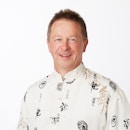Human Sleep Genetics
- Speaker
-
 Louis Ptáček, M.D.Professor, Neurology UCSF Weill Institute for Neurosciences, University of California, San Francisco
Louis Ptáček, M.D.Professor, Neurology UCSF Weill Institute for Neurosciences, University of California, San Francisco
Presidential Lectures are a series of free public colloquia spotlighting groundbreaking research across four themes: neuroscience and autism science, physics, biology, and mathematics and computer science. These curated, high-level scientific talks feature leading scientists and mathematicians and are designed to foster discussion and drive discovery within the New York City research community. We invite those interested in these topics to join us for this weekly lecture series.
Sleep is critical for health, and chronic sleep disruption increases the risk of virtually every disease. In 2012, modern human genetics was applied to understanding the genetics and biology of human sleep regulation for the first time. That year, Louis Ptáček, Ying-Hui Fu and their colleagues identified and characterized the first families with heritable normal circadian traits.
In this Presidential Lecture, Ptáček will discuss his research into the role of genetics in human sleep. He will discuss how he and Fu studied familial advanced sleep phase (FASP), a trait that manifests as a lifelong tendency to go to sleep and wake up unusually early (with wake-up times around 1–4 a.m.). Ptáček and Fu went on to characterize mutations in a growing list of genes that underlie the phenotype in around 15 percent of FASP families and to study them in vivo in mouse models. In vitro and in vivo experiments focused on regions harboring human mutations have led to novel insights in fine-tuning circadian period regulation by phosphorylation. More recently, with Fu’s identification of the first families with familial natural short sleep (FNSS), they’ve set out to identify a growing list of genes regulating sleep homeostasis and efficiency. As they begin to understand the biology underlying sleep, new opportunities are being presented to improve human health by targeting sleep quality as a target to reduce the risk of many diseases.
